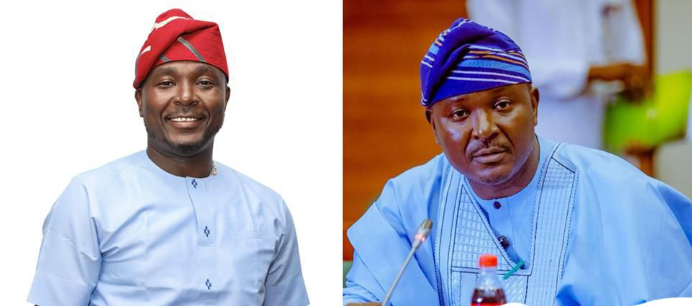
“Go Into Politics” — Akin Alabi Sparks Online Frenzy With Blunt Advice on Life’s Fastest Route to Ruin

In a world where success stories are often tied to political power and public offices are seen as ladders to influence, wealth, and status, one man has dared to call out the often-overlooked flip side of political ambition. Nigerian lawmaker, entrepreneur, and author, Oloye Akin Alabi, sent shockwaves across social media with a candid tweet that has since gone viral for its raw and unapologetic honesty. When asked, “What’s the fastest way a man can ruin his life?” Alabi responded with chilling precision: “Go into politics.”
The brief yet potent response came during a thread initiated by a user @theLawrenz, who posed a seemingly casual, barbershop-style question: “Man to man, what’s the fastest way a man can ruin his life?” Alabi, known for his outspokenness, did not mince words, instantly capturing the attention of thousands who saw the reply as either brutally true, painfully ironic, or deeply layered in political satire.
Reactions poured in swiftly from all corners of the internet, with netizens split between applause, reflection, and outright outrage. Some hailed the statement as a rare moment of transparency from someone inside the system, a truth bomb that cut through the fog of idealism and reminded Nigerians of the harsh political realities. Others saw it as a hypocritical jab coming from a man who is himself a sitting lawmaker, wondering if the comment was a confession, a deflection, or an insider’s cry for help.
Akin Alabi, a member of the House of Representatives and founder of NairaBET, is no stranger to controversy. His political journey has not been devoid of criticism and scrutiny, but he has managed to keep a reputation for being forthright and somewhat rebellious against the traditional script of Nigerian politics. So when he tweeted that politics could be the fastest way to destroy a man’s life, many didn’t just see it as a joke — they saw it as a window into a system so corrosive, even its own players no longer recommend it.
The timing of his statement could not be more poignant. Nigeria’s political climate is currently saturated with reports of scandals, defections, intra-party betrayals, economic disillusionment, and worsening public trust in governance. With the 2027 general elections already beginning to cast long shadows on current office holders, Alabi’s remark feels like a reflection of growing frustration within the ranks of political stakeholders themselves.
Social commentators and political analysts have since weighed in on the ripple effects of the tweet. “This isn’t just a hot take; it’s a revealing moment,” said Bisi Afolabi, a political columnist based in Abuja. “When someone who has tasted the ins and outs of Nigeria’s political ecosystem says politics can ruin your life, you don’t laugh — you listen. And you ask: what exactly is ruining these lives? Is it the system? The expectations? The lies? Or the compromises one must make?”
On X (formerly Twitter), users gave their own interpretations. One user wrote, “This right here is why politics in Nigeria has become a blood sport. You either lose your peace, your reputation, your morality, or your soul — and sometimes all four.” Another said, “It’s not politics that ruins you, it’s the people in it. But when the bad eggs outnumber the good ones, the system becomes poison.”
Yet, others found the humor in the tweet, choosing to see it as dry wit from a man who knows how to work a crowd. One reply read: “Oga just dey yarn truth coded in banter. Na only people wey don chop political breakfast go understand.” Another said, “So this is how you people warn us without warning us. Noted.”
Interestingly, while the tweet sparked debate about the nature of politics in Nigeria, it also ignited conversations about mental health, identity loss, and the unseen costs of power. Many pointed out that politics often consumes more than it gives — breaking families, friendships, principles, and even sanity. Tales of politicians who entered the arena with idealism only to exit with scars — both emotional and reputational — abound in the country’s democratic history.
For young Nigerians who once romanticized political participation as the noblest form of patriotism, Alabi’s comment may serve as a sobering reminder that the game is rigged with traps far more devastating than failure. It’s not just about losing elections; it’s about losing oneself in a world where loyalty is transactional, truth is negotiable, and survival is a sport of its own.
Still, some critics argue that such comments are unproductive coming from people who could work to change the system from within. “You cannot occupy the seat and then discourage others from coming in,” said Ngozi Eke, a civic activist. “We need people like him to lead reforms, not post sarcastic takes. If politics is truly ruinous, then help us fix it — don’t just tweet about it.”
Nevertheless, the cultural impact of the tweet is undeniable. In a country where silence often protects status and candor is rare among politicians, Akin Alabi’s statement struck a chord that refused to fade. It was a 6-word thesis on the internal battles many public servants face behind their crisp agbadas and campaign smiles.
Whether it was intended as a joke, a warning, or a lament, Alabi’s words continue to echo in a nation that has grown both weary and wary of politics. It is a stark reminder that power, while seductive, is not without its demons — and for some, those demons might be the fastest ticket to personal ruin.
For now, the conversation continues. And perhaps that is what matters most — not whether Akin Alabi regrets entering politics, but that he has reignited a national dialogue on what it truly costs to serve, to lead, and to survive in the jungle that is Nigerian politics.


